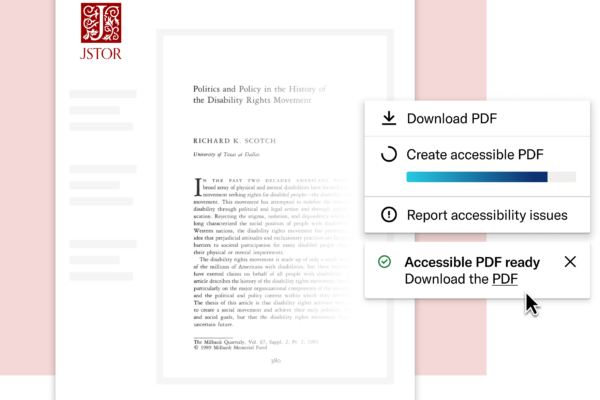
As the digital landscape continues to evolve, accessibility remains crucial in ensuring equitable access to information for all individuals, including those with disabilities.
At ITHAKA, we are dedicated to fostering an inclusive environment by adhering to the highest standards of accessibility. With the impending implementation of the European Accessibility Act (EAA), our commitment to accessibility is more vital than ever.
What is the European Accessibility Act?
The European Accessibility Act (EAA), signed by the European Union in June 2019, is set to go into effect on June 28, 2025. This landmark legislation aims to enhance accessibility for individuals with disabilities by requiring compliance with uniform European standards for a range of products and services that are offered to consumers in the EU in industries such as communication, finance, and transportation.
The law requires that covered products and services meet the EU’s accessibility requirements. These requirements are largely based on the Web Content Accessibility Guidelines (WCAG) criteria, as outlined in EN 301 549. Specifically relevant to ITHAKA, the EAA includes references to e-books as a service and ensuring related websites meet these requirements. As outlined below, we are aware of these requirements and are confident that our existing procedures and process will ensure our adherence to these regulations.
ITHAKA’s commitment to accessibility
At ITHAKA, accessibility is not just a legal obligation; it’s a core part of our mission to promote inclusivity and equitable access to educational resources. We are committed to ensuring that all digital content and services we provide are accessible to individuals with disabilities. To this end:
- Transparency and compliance: We provide accessibility conformance reports (VPATs) for each of our products that document our adherence to WCAG standards. For an example, see JSTORs Accessibility Policy page which links to the current VPAT.
- Adherence to WCAG: We use the Web Content Accessibility Guidelines (WCAG) as our benchmark for accessibility. This is the industry standard and meets our institutions’ and users’ expectations as well as satisfies legal compliance requirements. Our current VPAT shows our conformance to WCAG 2.1 AA and will be releasing an updated version that includes WCAG 2.2 AA later this year.
- EU accessibility task force: We have established a dedicated team to focus on confirming our practices meet the requirements of the EAA and continually improve our accessibility efforts.
Books at JSTOR and the EAA
As part of our mission to make knowledge accessible worldwide, we have been monitoring the EU Accessibility Act and our Content Strategy and Relationships, Accessibility, and Legal teams have been analyzing its implications. While our current offering aligns with the relevant standards, we are consistently collaborating with our publishers to ensure they meet and adapt to evolving standards. This fall, we plan to host an informational webinar to further educate our partners and start a dialog around the EAA.
As stated in JSTOR’s Accessibility Conformance Report, our ebook content is generally accessible and our support documentation for submissions outline best practices to guide our publishers. This includes information for adding alternative text for images and ensuring the content is tagged in a meaningful and logical order. If JSTOR receives an image-only PDF, as part of the processing we apply optical character recognition (OCR) to the file to make it machine readable and searchable.
Going forward
The European Accessibility Act represents a significant step forward in ensuring that digital content and services are accessible to all individuals, regardless of their abilities. At ITHAKA, we are committed to meeting and exceeding these standards, reinforcing our dedication to inclusivity and equitable access to educational resources. As we continue to work closely with our publishers, to explore alternative formats other than PDFs, we remain steadfast in our mission to create a more accessible and inclusive digital world.



